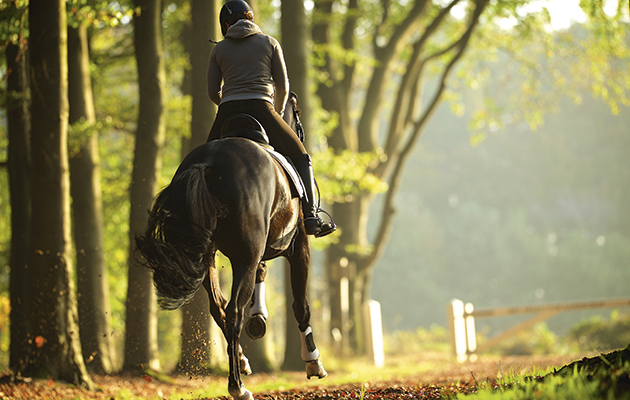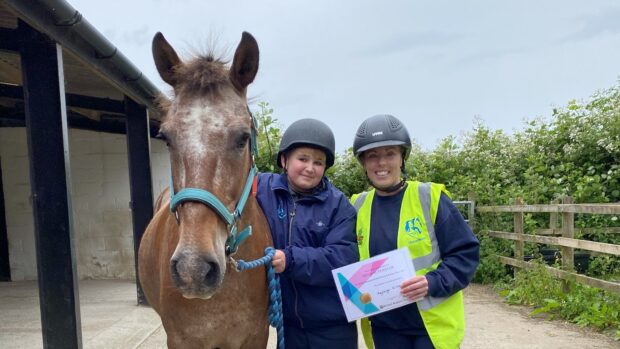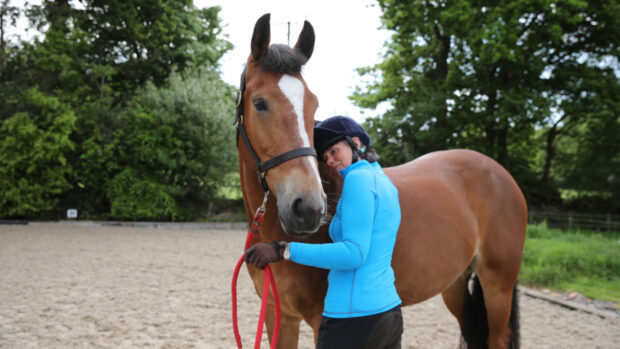When we discuss the health benefits of horse riding, we hear a lot about how time spent in the saddle improves physical wellbeing, but another major positive are the mental health benefits of horse riding
Multiple studies have shown interaction with horses can help with mental health conditions. For instance, horses can help reduce anxiety, and symptoms of depression, and could even assist in long-term mental fitness. According to the British Horse Society (BHS), horse riding could potentially lower the chance of suffering from dementia by up to 30%.
It’s not unusual for equestrians to refer to their horse as their therapist. And, with a bank of research showing that horses and horse riding benefit mental health, they might be on to something. But how specifically do horses help us? Well, the list is practically endless, and it can depend on the individual. For example, for adults with complex needs the mental health benefits of horse riding can range from increased self-confidence to aiding independence and organisational skills. As such, the power of horses to transform lives should not be underestimated.
5 mental health benefits of horse riding
1. Horses reduce anxiety
Anyone who has ridden or cared for an equine knows doing so leaves little room to dwell on anything else. This practice of being in the moment has another name: mindfulness. It involves being aware of what you can see, hear and feel in that moment – something that comes naturally on horseback. The NHS recommends practising mindfulness to reduce stress and anxiety – and some NHS nurses even enlist the help of donkeys to practise mindfulness.
Other studies have found that riding can reduce heart rates, guiding riders in to a more tranquil state of being. One study found that 30 minutes of horse trekking helped riders shift in to parasympathetic nervous system control – leaving the “fight or flight” state and entering a state of relaxation and lowered anxiety. Additionally, Hoagwood et al. (2022) found that equine-assisted therapy can help boost oxytocin (a “feel-good hormone”) and lower cortisol, which is associated with stress and anxiety.
2. Horses help us regulate emotions
Sometimes, big and uncomfortable feelings are difficult to sit with. However, horses require us to operate clearly and calmly around them to help maintain their level-headedness. It’s something exposure to horses teaches you over time, and a skill that can be transformative in all life settings.
Multiple studies have shown that equine activities lead to the development of better coping skills and the ability to self-regulate emotions. What’s more, a qualitative study by Højgaard-Bøytler & Argentzell (2023) found that victims of abuse were better able to connect with their emotions through bodily awareness while riding, and handle these emotions more effectively.
3. Horses help with depression
Exercise is well-documented as a positive way to combat depression. A study by Farmer et al. (1998) indicated that physical inactivity may be a risk factor in symptoms of depression. Meanwhile, Dimeo et al. (2001) found that aerobic exercise led to an improvement in mood for patients with major depressive disorders.
But exercise with horses has another layer of meaning. Riding benefits both horse and rider with healthy exercise, but so too do physical equine activities such as grooming and leading. For example, Frederick et al. (2015), found that a five-week equine-assisted learning programme lead to reduced levels of depression and increased hope in ‘at-risk’ adolescents. In the saddle or out of it, active exercise around horses is a real mood-booster.
4. Horses help reduce negative thoughts
We already know horses improve anxiety, but they also help banish negative thought patterns. A recent survey questionnaire from the BHS showed that for 80% of respondents, riding makes them feel either ‘quite a lot’ or ‘extremely’ cheerful, happy and relaxed. Furthermore, a 2019 study that asked participants to use a single word to describe their experience of leading a horse through an obstacle course received 98% positive responses.
Another study found that negative thoughts associated with PTSD were significantly reduced for military veterans participating in equine-assisted psychotherapy.
5. People who ride horses are happier overall
The far-reaching benefits of horse riding and horse care contribute to a happier life on many levels. One way this is evidenced is in the satisfaction gained from equine responses to owners’ care decisions. Another study showed an increase in overall satisfaction and happiness in participants who took part in a three-day hippotherapy course.
Not only do horses improve anxiety and depression, but they also allow us to harness a stronger connection with nature. Numerous studies have shown that time spent in the natural world buttresses human mental health, and horses help us make that meaningful link with green spaces. This gives horse riders an emotional attachment to their surroundings, and BHS research shows connection with nature is a motivator for riders.
Humans are social animals and this study on individuals with complex needs shows that horses can facilitate improved social connectedness. We see this played out on livery yards and at competition and equestrian centres – every day, horses enrich our social lives by helping us form bonds with like-minded people.
- To stay up to date with all the breaking news throughout major shows such as London International and more, subscribe to the Horse & Hound website
You may also be interested in:

Equine therapy: how horses can help with stress, anxiety, and trauma

6 very good reasons to take up horse riding

Subscribe to Horse & Hound magazine today – and enjoy unlimited website access all year round




